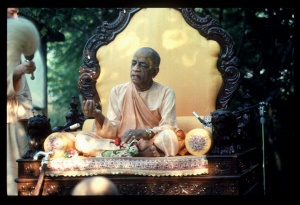CC Madhya 19.205 (1975): Difference between revisions
(Vanibot #0027: CCMirror - Mirror CC's 1996 edition to form a basis for 1975) |
(Vanibot #0019: LinkReviser - Revise links, localize and redirect them to the de facto address) |
||
| Line 2: | Line 2: | ||
<div style="float:left">'''[[Sri Caitanya-caritamrta (1975)|Śrī Caitanya-caritāmṛta (1975)]] - [[CC Madhya (1975)|Madhya-līlā]] - [[CC Madhya 19 (1975)|Chapter 19: Lord Śrī Caitanya Mahāprabhu Instructs Śrīla Rūpa Gosvāmī]]'''</div> | <div style="float:left">'''[[Sri Caitanya-caritamrta (1975)|Śrī Caitanya-caritāmṛta (1975)]] - [[CC Madhya (1975)|Madhya-līlā]] - [[CC Madhya 19 (1975)|Chapter 19: Lord Śrī Caitanya Mahāprabhu Instructs Śrīla Rūpa Gosvāmī]]'''</div> | ||
<div style="float:right">[[File:Go-previous.png|link=CC Madhya 19.204 (1975)|Madhya-līlā 19.204]] '''[[CC Madhya 19.204 (1975)|Madhya-līlā 19.204]] - [[CC Madhya 19.206 (1975)|Madhya-līlā 19.206]]''' [[File:Go-next.png|link=CC Madhya 19.206 (1975)|Madhya-līlā 19.206]]</div> | <div style="float:right">[[File:Go-previous.png|link=CC Madhya 19.204 (1975)|Madhya-līlā 19.204]] '''[[CC Madhya 19.204 (1975)|Madhya-līlā 19.204]] - [[CC Madhya 19.206 (1975)|Madhya-līlā 19.206]]''' [[File:Go-next.png|link=CC Madhya 19.206 (1975)|Madhya-līlā 19.206]]</div> | ||
{{CompareVersions|CC|Madhya 19.205|CC 1975|CC 1996}} | |||
{{RandomImage}} | {{RandomImage}} | ||
==== TEXT 205 ==== | ==== TEXT 205 ==== | ||
| Line 27: | Line 26: | ||
<div class="translation"> | <div class="translation"> | ||
" 'Although Kṛṣṇa is beyond sense perception and is unmanifest to human beings, he takes up the guise of a human being with a material body. Thus mother Yaśodā thought Him to be her son, and she bound Lord Kṛṣṇa with rope to a wooden mortar, as if He were an ordinary child.' | |||
</div> | </div> | ||
| Line 34: | Line 33: | ||
<div class="purport"> | <div class="purport"> | ||
This verse from Śrīmad-Bhāgavatam ([[SB 10.9.13-14| | This verse from Śrīmad-Bhāgavatam ([[SB 10.9.13-14|10.9.14]]) is in reference to Lord Kṛṣṇa's exhibiting Himself like an ordinary child before mother Yaśodā. He was playing like a naughty boy stealing butter and breaking butter pots. Mother Yaśodā became disturbed and wanted to bind the Lord to a mortar used for pounding spices. In other words, she considered the Supreme Personality of Godhead an ordinary child. | ||
</div> | </div> | ||
Latest revision as of 15:44, 18 September 2020

A.C. Bhaktivedanta Swami Prabhupada
TEXT 205
- taṁ matvātmajam avyaktaṁ
- martya-liṅgam adhokṣajam
- gopikolūkhale dāmnā
- babandha prākṛtaṁ yathā
SYNONYMS
tam—Him (Kṛṣṇa); matvā—considering; ātmajam—own son; avyaktam—unmanifested; martya-liṅgam—manifested as if perishable; adhokṣajam—beyond the perception of the senses; gopikā—mother Yaśodā; ulūkhale—to the mortar; dāmnā—with rope; babandha—bound; prākṛtam—an ordinary child; yathā—like.
TRANSLATION
" 'Although Kṛṣṇa is beyond sense perception and is unmanifest to human beings, he takes up the guise of a human being with a material body. Thus mother Yaśodā thought Him to be her son, and she bound Lord Kṛṣṇa with rope to a wooden mortar, as if He were an ordinary child.'
PURPORT
This verse from Śrīmad-Bhāgavatam (10.9.14) is in reference to Lord Kṛṣṇa's exhibiting Himself like an ordinary child before mother Yaśodā. He was playing like a naughty boy stealing butter and breaking butter pots. Mother Yaśodā became disturbed and wanted to bind the Lord to a mortar used for pounding spices. In other words, she considered the Supreme Personality of Godhead an ordinary child.